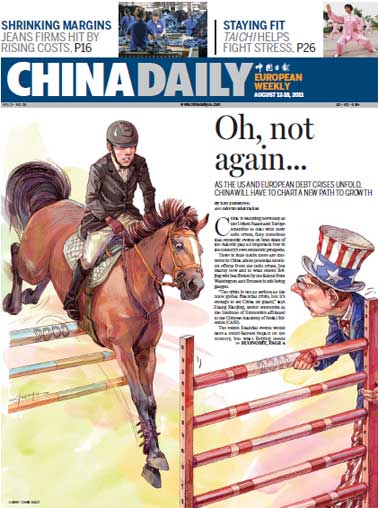Economy
Munich Re stake signals 'strategic shift' on reserves
Updated: 2011-08-16 08:04
By Li Xiang (China Daily)
BEIJING - China's investment in German reinsurance company Munich Re Group is a sign that the country's foreign exchange regulator might be seeking out higher-yielding but riskier investments in order to diversify the nation's massive foreign reserves, analysts said on Monday.
The State Administration of Foreign Exchange (SAFE), which manages China's $3.2 trillion in foreign reserves, has acquired a 3.04 percent stake in Munich Re, the world's largest reinsurer by the volume of premiums charged annually, according to the German group.
Analysts said that China might start to accelerate the diversification of its foreign reserves by shifting toward higher-yielding but riskier equity investments and away from traditional fixed-income products.
"It is reasonable for SAFE to use some of the foreign exchange reserves to engage in riskier equity investment, as reserves have reached an excessive level," said Zhao Qingming, a researcher at China Construction Bank Corp.
US investor Warren Buffett, the largest shareholder in the German company, raised his stake to more than 10 percent last year.
SAFE has long followed a conservative investment strategy that guarantees liquidity and safety, investing mainly in low-risk, fixed income products such as US Treasury securities and the government bonds of Japan and some European nations.
China held $1.16 trillion in US government debt as of May, according to the US Treasury Department.
Economists estimate that China's dollar-based assets account for about 70 percent of its total foreign reserves.
The downgrade of the US' long-term credit rating has raised concerns about the safety of China's huge dollar-based assets, and some analysts said these concerns might prompt the country to adjust its foreign exchange portfolio.
They argued that China should diversify its rapidly accumulating foreign reserves by using them more strategically to acquire resources and expand overseas investment.
It has been reported that the China Investment Corp (CIC), the country's $300 billion sovereign wealth fund, will invest $4.28 billion for a 30 percent stake in French energy company GDF Suez SA.
CIC was set up in 2007 to manage part of the country's foreign reserves. Wang Jianxi, executive vice-president of CIC, said in March that the fund had shifted its investment strategy to focus more on assets such as property, commodities and natural resources to seek higher returns.
However, some analysts argued that it would be wrong for China to abruptly diversify its foreign reserves away from dollar-based assets as doing so might lead to an even faster accumulation through the "hot money" channel.
"The rapid decline in the value of the dollar forced by China's selling will put China under greater pressure to revalue its currency," said Ma Jun, greater China chief economist for Deutsche Bank AG.
"The expectation of a faster revaluation of the yuan in the future will trigger even stronger hot money inflows," he said.
China Daily
E-paper

Going with the flow
White-collar workers find a traditional exercise helps them with the frustrations of city life
The light touch
Long way to go
Outdoor success
Specials

Star journalist remembered
Friends, colleagues attended a memorial service to pay tribute to veteran reporter Li Xing in US.

Robots seen as employer-friendly
Robots are not new to industrial manufacturing. They have been in use since the 1960s.

A prosperous future
Wedding website hopes to lure chinese couples
